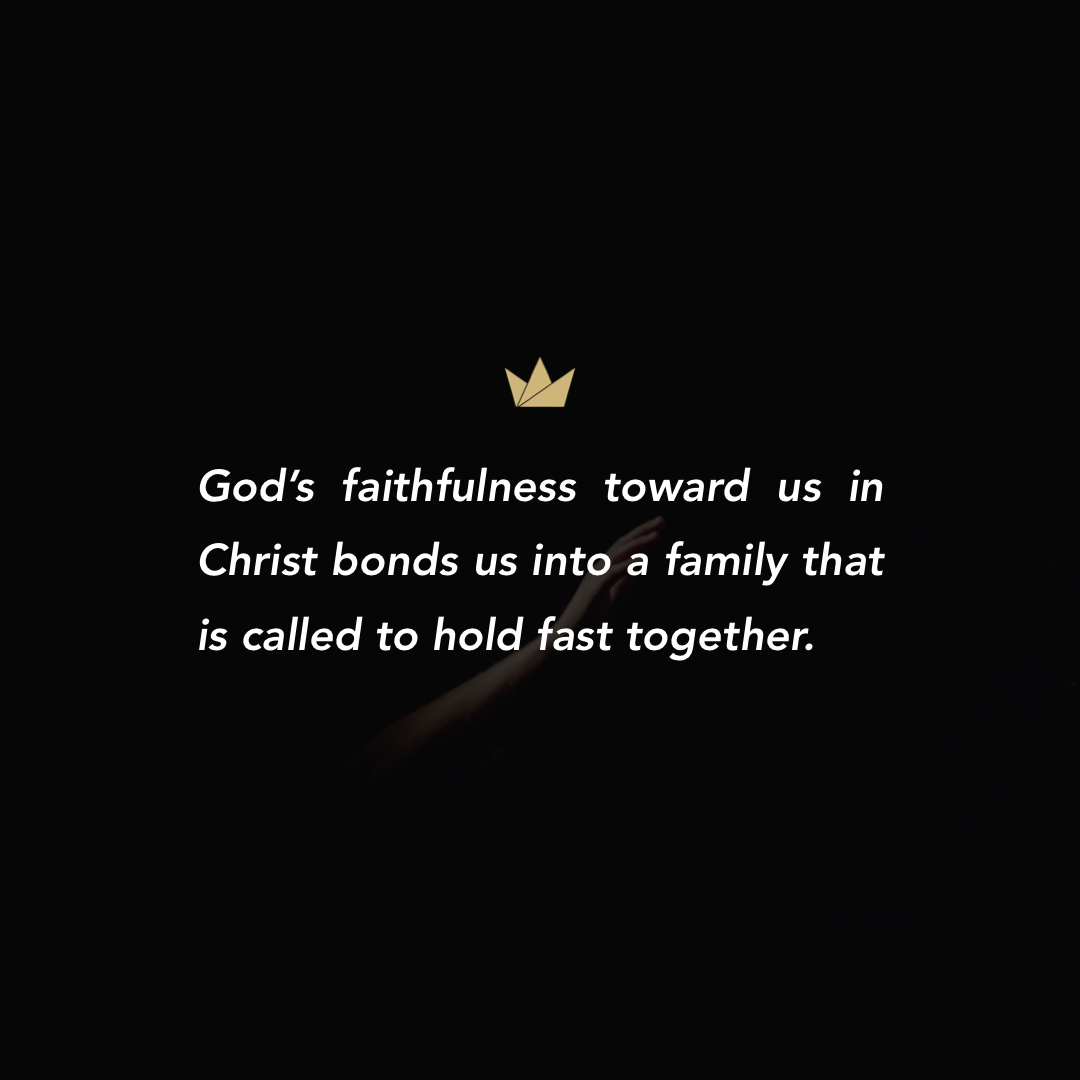Hebrews 10:19-25
January 13th, 2019
What happens to the church in this environment? It’s not that suddenly all the sanctuaries are emptied and the church gets rejected. Instead, the people who continue to attend church do so because they believe the church can help them find and express themselves. Religiosity doesn’t disappear; it morphs into something adaptable, something you embrace on your own terms. Faith is no longer focused on reality or something true; it’s a therapeutic choice intended to aid you in your pursuit of self-exaltation and self-fulfillment. - Trevin Wax
Main idea: God’s faithfulness toward us in Christ bonds us into a family that is called to hold fast together.
I. THE BASIS OF OUR FAMILY (10:19-21)
The “holy places” here is a reference to the innermost part of the tabernacle/temple, that was only accessible to the High Priest once a year on the Day of Atonement. It was unaccessible and dangerous.
But now, the author urges this community that they have “confidence to enter” this place. How is that possible?
They have confidence through the blood of Jesus, who, through his death, has torn the curtain that separated mankind from the presence of God
Because of this work, Jesus now serves as our High Priest, interceding and pleading on our behalf before God.
Application:
These verses push back on a rugged individualism in 2 ways:
1. This pushes us to define our identity upward, not inward. (Cf. Colossians 3:1-4)
2. Jesus as our High Priest is connecting us to the community of the Trinity. Community is not merely a good suggestion: it’s at the center of God Himself.
II. THE BEHAVIOR OF OUR FAMILY (10:22-25)
How do we actually access the presence of God? How do we take advantage of our confidence to enter this holy place? The author makes it clear that it is only through one another. The family of the church is where the presence of God is seen and experienced.
This section is framed by 3 exhortations to the community:
1. We draw near (10:22).
We do so with “true’ (sincere, genuine) hearts, with full confidence, because our hearts have been sprinkled clean & made new. But we must draw near together.
In friendship, we think we have chosen our peers. In reality, a few years difference in the dates of our births, a few more miles between certain houses, the choice of one university instead of another...the accident of a topic being raised or not raised at a first meeting--any of these chances might have kept us apart. But, for a Christian, there are, strictly speaking, no chances. A secret master of ceremonies has been at work. Christ, who said to the disciples, "You have not chosen me, but I have chosen you," can truly say to every group of Christian friends, "You have not chosen one another but I have chosen you for one another." The friendship is not a reward for our discriminating and good taste in finding one another out. It is the instrument by which God reveals to each of us the beauties of others. - C.S Lewis
2. We hold fast (10:23)
We don’t do this very well on our own, however. We need one another to remind us that God is faithful and that He will bring to completion the good work that has begun in us (Cf. Phil. 1:6).
3. We consider one another (10:24-25)
To “stir up” literally means “to irritate” or “agitate.” We need people in our lives who can have the hard conversation with us, and to speak the truth in love
In all of this, we cannot neglect meeting together. We must fight to show up. There were some in this community who were neglecting this. Do we have margin for one another?
So then, what if the Church became the first place, instead of the last place, that people went looking for family? What if the Church was filled with unmarried people but had no “single” people, because unmarried people were as family to each other, and surrogate brothers and sisters and mothers and fathers and sons and daughters to the rest of the Church? What if the Church was the place where no parent felt the burden of having to raise children alone, and where every child had hundreds of mothers and fathers and grandmas and grandpas and aunts and uncles and big sisters and brothers? What if it were true that God sets the lonely in families? What if the Church was the place where anyone in the world could find refuge and solace from the age-old curse—first uttered into Paradise—that it is not good to be alone? - Scott Sauls


